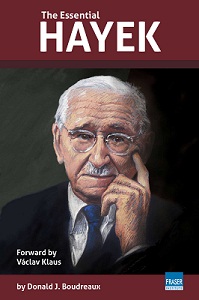
Don Boudreaux has an excellent new little book, “The Essential Hayek“. It is a remarkable work in a number of ways.
Boudreaux and the publisher–the Vancouver-based Fraser Institute–are leveraging the Internet to make Hayek’s work accessible to a wider audience. The book goes with a dedicated website, “The Essential Hayek,” and with a series of videos to present Hayek’s ideas in the most accessible form.
I find the videos very nice indeed. They use examples that I suppose a very young person could find persuasive. Obviously I can’t say whether they will be effective or not. This sort of thing need to be “tested” on kids, and I wonder how Fraser is thinking to connect with them. If the delivery is as brilliant as the production, there will be a lot there to learn and to copy from for other free market organizations.
In just a few days, the video on “Knowledge and Prices” was seen over 2,000 times, which is good, but I suspect most of the viewers may be people who are somehow already acquainted with Hayek’s ideas. Getting to the very young is difficult indeed. At Istituto Bruno Leoni, in Italy, we do organize some “basic lectures in economics” (actually two lectures: one on “I, pencil” and the other on the concept of opportunity cost), that this year reached some 2,000 high school students – I mean, students that we physically met in their classes. This is like emptying the sea with a spoon, but it has the advantage of allowing to “test” lectures directly on school kids and learn from their questions and reactions.
The website for “The Essential Hayek” has more than videos (including a PDF version of the book) and it should be praised for keeping, well, essential. Links are used to direct the readers to further resources, but readers are not showered with erudite information they are not most likely to use.
Last but not least, the most remarkable thing is the book itself. Boudreaux is a great teacher of economics, and that comes out on every page. “The Essential Hayek” is not the shortest possible scholarly book on Hayek, neither the shortest possible biography of Hayek. It is a concise, beautifully written and splendidly clear exposition of Hayek’s thought. Quotations are kept to a minimum. What Boudreaux prepared is, in fact, a short and yet accurate course on “the-world-as-Hayek-taught-us-to-see-it” for people not necessarily conversant in economic matters. A reader who limits her economic education to “The Essential Hayek” will get, indeed, the essentials of Austrian business cycle theory, of the Keynes/Hayek dispute, and of the Hayekian argument of knowledge being dispersed in society and coordinated through the market process. Boudreaux actually begins with his version of “I, pencil” and the wonder of the price system- the example he uses is ink and paper. Those three pages are a masterpiece, presenting a very counter-intuitive argument in the simplest form–and so is Boudreaux’s explanation of booms and busts.
For all those acquainted with Hayek and Hayek’s ideas, reading Boudreaux’s book is a real delight. For those who aren’t, it could be a true eye-opener–and so I hope many of them will stumble upon this little book, somehow.

READER COMMENTS
Philo
Jul 11 2015 at 7:43am
Did you mean: “the-world-as-Hayek-tAught-us-to-see-it”?
ThomasH
Jul 11 2015 at 8:09am
Pretty good if the only problem were people’s naive idea that the economy must and can be managed by central planners. It leaves out things like what Hayek would have thought about externalities and other situations in which the conditions for optimality of market transactions do not hole, collective consumption like the Large Hadron Collider, and market monetarist theory of business cycles.
David R. Henderson
Jul 11 2015 at 9:17am
@Philo,
Good catch. Change made.
Chris Hunt
Jul 11 2015 at 9:32am
Essential reading for youngsters (by the sounds of it), along with Murphy’s “Lessons for the Young Economist“.
Gil Kemp
Jul 12 2015 at 8:32am
[Comment removed pending confirmation of email address. Email the webmaster@econlib.org to request restoring this comment. A valid email address is required to post comments on EconLog and EconTalk.–Econlib Ed.]
Pajser
Jul 13 2015 at 5:07am
Did Hayek ever explicitly asked “What is morally better, capitalism or socialism?”
Comments are closed.